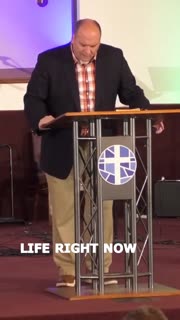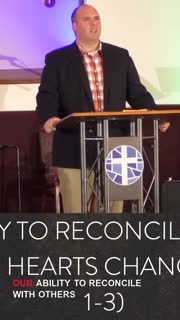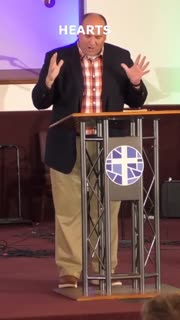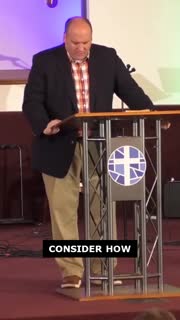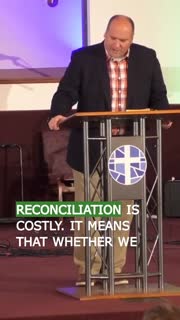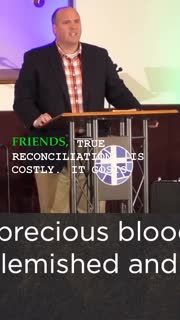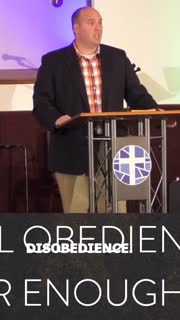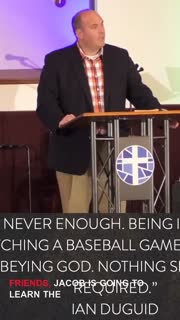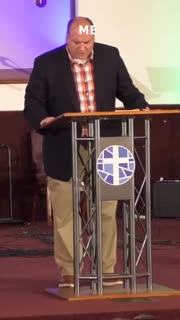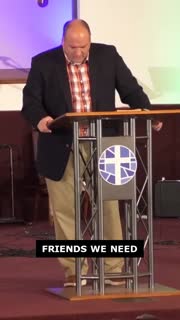Transforming Hearts: The Power of Reconciliation
Devotional
Sermon Summary
Bible Study Guide
Sermon Clips
1. "Maybe if you think in your life right now that there are relationships that need to be restored—a family member, a friend, or even with maybe God himself—friends, you might think that it's impossible, but a heart changed by God can change all of it. I encourage you to reflect on your own life and the relationship that needs mending. Maybe you think that it's impossible, but instead submit your heart to God and watch him work." [46:15] (34 seconds)
2. "Our ability to reconcile with others comes from hearts changed by God. In the first three verses, we see that Jacob is seeing Esau come, that he has his children and his slaves with him, and he went on himself and bowed down seven times until he approached his brother. Friends, if we want to see peace in our messy lives, we need hearts changed by God so that we can reconcile with others." [47:58] (33 seconds)
3. "When we melt our hearts by God's grace, the pieces that have shattered can be brought together in unity. Similarly, in our hearts, we need our hearts reshaped by God so that we can reconcile with others. These are moments of vulnerability that we need to be able to overcome, and we need to trust with God. It is in this transforming power of God that he molds our hearts so we seek reconciliation." [51:41] (28 seconds)
4. "Consider how God might be calling you today to let go of some self-sufficiency in your own heart and to bring reconciliation into a relationship. Friend, this is not something that you can will up and power up. It actually only comes from being weak, allowing God to lead. Remember, it is the transforming power of the Spirit working in you that will actually be at work." [53:08] (33 seconds)
5. "Reconciliation is costly. It means that whether we are humbling ourselves, forgiving a past debt, or ourselves giving something over, inside, reconciliation is costly. The great Tim Keller, pastor in New York who's passed, wrote this, 'Forgiveness is always a form of costly suffering.' If someone has wronged you deeply, there is no way to deal with the issue without suffering." [01:01:44] (35 seconds)
6. "Friends, true reconciliation is costly. It costs Christ His life. Imagine this, friends, the God of the universe whom we rebelled against while we were sinners gave His own Son so that we could come to Him. Friends, it is costly, but it's worth every sacrifice. It was worth Christ's death so that we could come to be saved. And even in our sacrifices to reconcile, oh, how beautiful it is when people have come together in love that were once apart." [01:03:37] (46 seconds)
7. "Partial obedience to God is never enough. When it comes to our walk with God, partial obedience is not just incomplete, it's disobedience. Full obedience shows us to live for righteousness, but also in our ways to reconciliation. We need to fully obey in this area of our life. Partial obedience is incomplete, it's disobedience, and we see this here in Jacob's life." [01:05:28] (60 seconds)
8. "Friends, Jacob is going to learn the consequence of a God who is partially obeyed. Shechem becomes a devastating part of his history and his family, including the violation of his daughter, violent actions of his son. Elohe Israel, Jacob's mighty God, would have to effect obedience in Jacob the hard way. Friends, full-on grace doesn't mean the easy way. Full-on grace, often by God's hand, is harsh punishment and fearsome." [01:07:13] (43 seconds)
9. "Brothers and sisters, let me encourage you, no matter what your rationalizations are, comply to reconciliation in your life directed by God. You might even say to me, 'But pastor, you don't know what I did to this person. There's no way they'll forgive me.' You might even say, 'But pastor, you'll never believe what that person did to me.' And I would say, can we imagine what we've done to God that he fully restored us through his son?" [01:11:03] (48 seconds)
10. "Friends, we need to pray to ask God to rework our hearts, to empower us to ask for forgiveness, to empower us to grant forgiveness. We need to have a fresh reminder of the sacrifice that God made in reconciling us to him. So this morning, brothers and sisters, can we celebrate the fact that God in our messy lives will empower us to reconcile with others?" [01:12:58] (39 seconds)
Ask a question about this sermon
2. "Our ability to reconcile with others comes from hearts changed by God. In the first three verses, we see that Jacob is seeing Esau come, that he has his children and his slaves with him, and he went on himself and bowed down seven times until he approached his brother. Friends, if we want to see peace in our messy lives, we need hearts changed by God so that we can reconcile with others." [47:58] (33 seconds)
3. "When we melt our hearts by God's grace, the pieces that have shattered can be brought together in unity. Similarly, in our hearts, we need our hearts reshaped by God so that we can reconcile with others. These are moments of vulnerability that we need to be able to overcome, and we need to trust with God. It is in this transforming power of God that he molds our hearts so we seek reconciliation." [51:41] (28 seconds)
4. "Consider how God might be calling you today to let go of some self-sufficiency in your own heart and to bring reconciliation into a relationship. Friend, this is not something that you can will up and power up. It actually only comes from being weak, allowing God to lead. Remember, it is the transforming power of the Spirit working in you that will actually be at work." [53:08] (33 seconds)
5. "Reconciliation is costly. It means that whether we are humbling ourselves, forgiving a past debt, or ourselves giving something over, inside, reconciliation is costly. The great Tim Keller, pastor in New York who's passed, wrote this, 'Forgiveness is always a form of costly suffering.' If someone has wronged you deeply, there is no way to deal with the issue without suffering." [01:01:44] (35 seconds)
6. "Friends, true reconciliation is costly. It costs Christ His life. Imagine this, friends, the God of the universe whom we rebelled against while we were sinners gave His own Son so that we could come to Him. Friends, it is costly, but it's worth every sacrifice. It was worth Christ's death so that we could come to be saved. And even in our sacrifices to reconcile, oh, how beautiful it is when people have come together in love that were once apart." [01:03:37] (46 seconds)
7. "Partial obedience to God is never enough. When it comes to our walk with God, partial obedience is not just incomplete, it's disobedience. Full obedience shows us to live for righteousness, but also in our ways to reconciliation. We need to fully obey in this area of our life. Partial obedience is incomplete, it's disobedience, and we see this here in Jacob's life." [01:05:28] (60 seconds)
8. "Friends, Jacob is going to learn the consequence of a God who is partially obeyed. Shechem becomes a devastating part of his history and his family, including the violation of his daughter, violent actions of his son. Elohe Israel, Jacob's mighty God, would have to effect obedience in Jacob the hard way. Friends, full-on grace doesn't mean the easy way. Full-on grace, often by God's hand, is harsh punishment and fearsome." [01:07:13] (43 seconds)
9. "Brothers and sisters, let me encourage you, no matter what your rationalizations are, comply to reconciliation in your life directed by God. You might even say to me, 'But pastor, you don't know what I did to this person. There's no way they'll forgive me.' You might even say, 'But pastor, you'll never believe what that person did to me.' And I would say, can we imagine what we've done to God that he fully restored us through his son?" [01:11:03] (48 seconds)
10. "Friends, we need to pray to ask God to rework our hearts, to empower us to ask for forgiveness, to empower us to grant forgiveness. We need to have a fresh reminder of the sacrifice that God made in reconciling us to him. So this morning, brothers and sisters, can we celebrate the fact that God in our messy lives will empower us to reconcile with others?" [01:12:58] (39 seconds)
